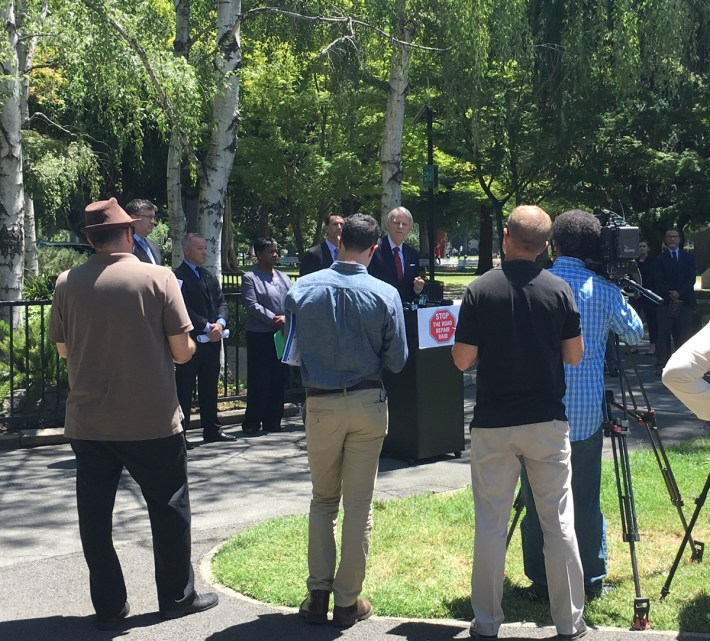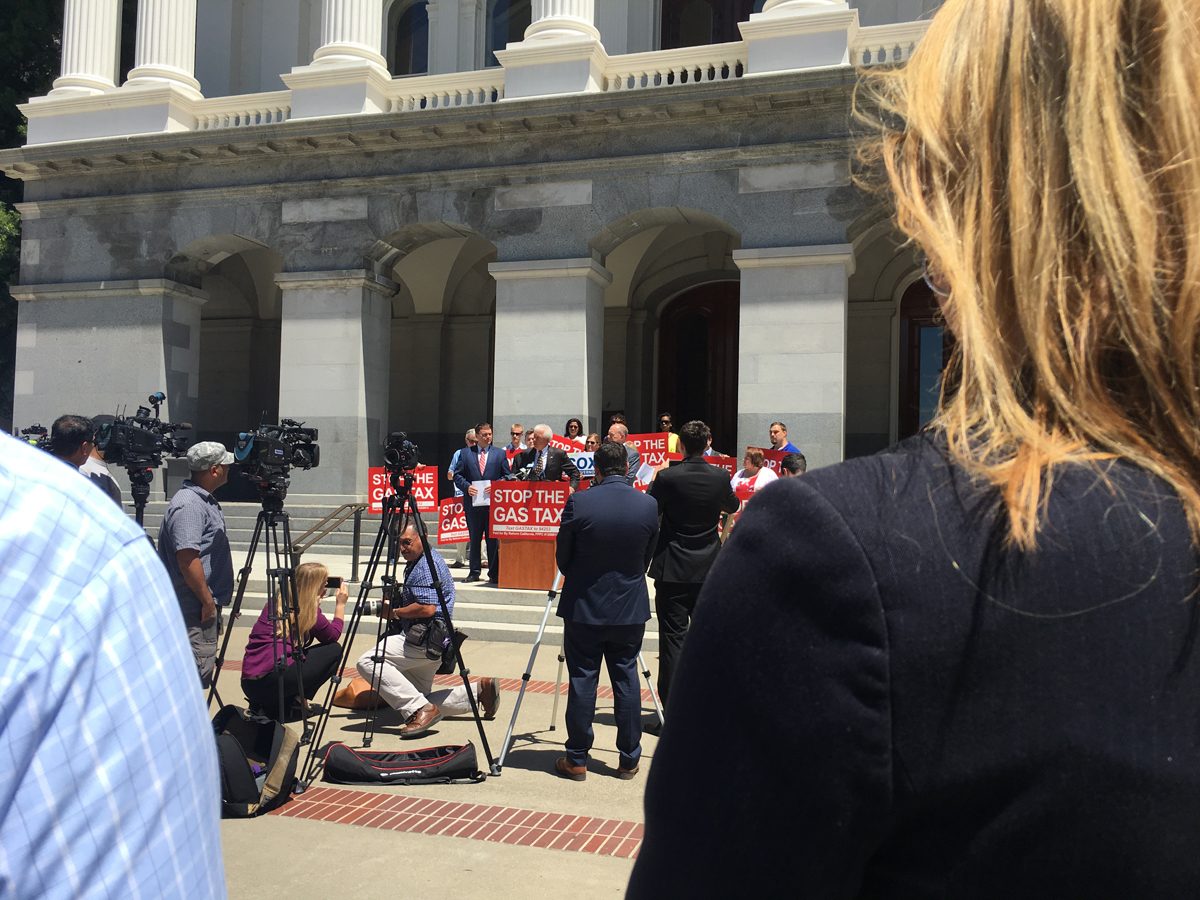Note: GJEL Accident Attorneys regularly sponsors coverage on Streetsblog San Francisco and Streetsblog California. Unless noted in the story, GJEL Accident Attorneys is not consulted for the content or editorial direction of the sponsored content.
The California legislature held a hearing Monday on an initiative to repeal S.B. 1, which raised gas taxes last year. The repeal initiative will be on the November ballot, and this hearing was required by law to be held before the end of June. So even though it was delayed for almost three hours—the Poor People's Campaign successfully interrupted business for a while in the legislative chambers—members of the committee dutifully filed in to sit and look at their phones while the public weighed in.
At least, what public was left to weigh in. The delay meant that several people who hoped to speak had to leave before the hearing was called to order. They included representatives from the NAACP and TransForm, both of whom said they supported the new gas taxes. Of the people that did stick around, all but a few spoke in strong opposition to the repeal.
Representatives from city after city after county after transit agency opposed the repeal. Government reps listed the repaving and road maintenance projects that they would no longer be able to fund, the jobs that their communities would lose, the leverage for more funding they would no longer have, and the backwards leap in pavement and transit vehicle quality that would be inevitable if S.B. 1 funding were no longer available.
Carl DeMaio, the author of the repeal initiative, also stuck around. He tried, unsuccessfully, to be the very last speaker at the hearing, waiting outside the chambers until public comment was about to close and then swooping in, muttering soto voce: “All right, then, I will.”
DeMaio had been joined by gubernatorial candidate John Cox outside the Capitol earlier in the afternoon, both of them addressing speeches to an audience of TV cameras plus a few curious observers (many of whom showed up later to testify against the repeal). DeMaio accused the committees—it was a joint hearing between the Senate Housing and Transportation, Assembly Transportation, and Assembly Revenue and Taxation committees—of holding a hearing “without inviting the opposition” so as to form the impression of unity against the repeal.

He may have forgotten about the Republicans on the dais, none of whom voted for S.B. 1.
DeMaio also accused the legislators of absconding with transportation funds to pay for pensions, as well as for road diets and transit. He pronounced the words “road diets” and “transit” with heavy sarcasm. If that is going to be a talking point in the campaign to repeal S.B. 1—and it will be—it's something proponents of S.B. 1's transportation revenue need to address, and loudly. The rhetoric from DeMaio and company has been that building roads for cars is the only qualified use for gas taxes. Repeal proponents push the idea that transit and alternative modes bring no benefits, have nothing to do with mobility, and do nothing to relieve traffic congestion.
DeMaio also threatened the legislators' jobs, using the recall of Assemblymember Josh Newman, who voted for S.B. 1, as an example of what could happen to them. Nevertheless, DeMaio remained vague about how road maintenance would be paid for if the repeal were to pass in November. “When this passes, we will rebuild our roads with the money we've already provided,” he said—inferring that transportation would be paid for out of the state's general fund.
A reminder: S.B. 1 raised the gas tax twelve cents per gallon, after two decades of declining--and increasingly uncertain--revenue due to more efficient vehicles and a refusal to adjust existing taxes. Meanwhile the price of gas has fluctuated by more than $1 just in the last year, and by a lot more than that if you go back a few years. S.B. 1 will raise $4.4 billion this year, and up to $5 billion a year in the future, to cover a maintenance backlog that stretches back for decades. S.B. 1 has oversight from a new Inspector General, and the just-passed constitutional amendment Proposition 69 prohibits using the revenue for anything but transportation.
The long line of people who waited to testify offered the following information about local impacts of the gas tax:
- Bad roads are “a heavy economic burden on farmers,” according to a representative of Merced County. Rough pavement and potholes greatly decrease the efficiency of vehicles transporting crops, compared to being able to operate on smooth pavement, he said. Although the amount of money Merced is getting from S.B. 1 is not as much as other areas, it would allow the county, for the first time, to develop a long-term plan for road maintenance.
- A representative of Marin County said that while proponents can list the benefits available from the gas tax revenue, it was also important to talk about costs. He calculated that the cost of maintaining roads came to an average of fourteen cents per day.
- A representative from Brisbane pointed out that potholes and bad roads are more than just an inconvenience. “When we don't maintain infrastructure, we knowingly place the public at risk,” he said. A speaker representing the city of Lodi had a similar message. Repealing the funding would, he said, “jeopardize public safety, and cost taxpayers much more money in the long run.”
- From Turlock: “S.B. 1 enables cities and counties, for once, to have a funding mechanism to address maintenance. Our pavement condition is deteriorating rapidly, and the $850,000 we got this year is not chump change to us.”
- Lakewood: “The repeal would derail projects large and small that improve the quality of life in this underinvested community.”
- Nevada County: “S.B. 1 fills a funding gap we cannot fill, and we would have to leave our roads unmaintained. Also, how can we make any progress towards Vision Zero without funding?”
Throughout the state, agencies are getting to work on long lists of needed transportation infrastructure maintenance. These efforts may be short-lived if voters repeal S.B. 1.
Follow Streetsblog California on Twitter @StreetsblogCal






